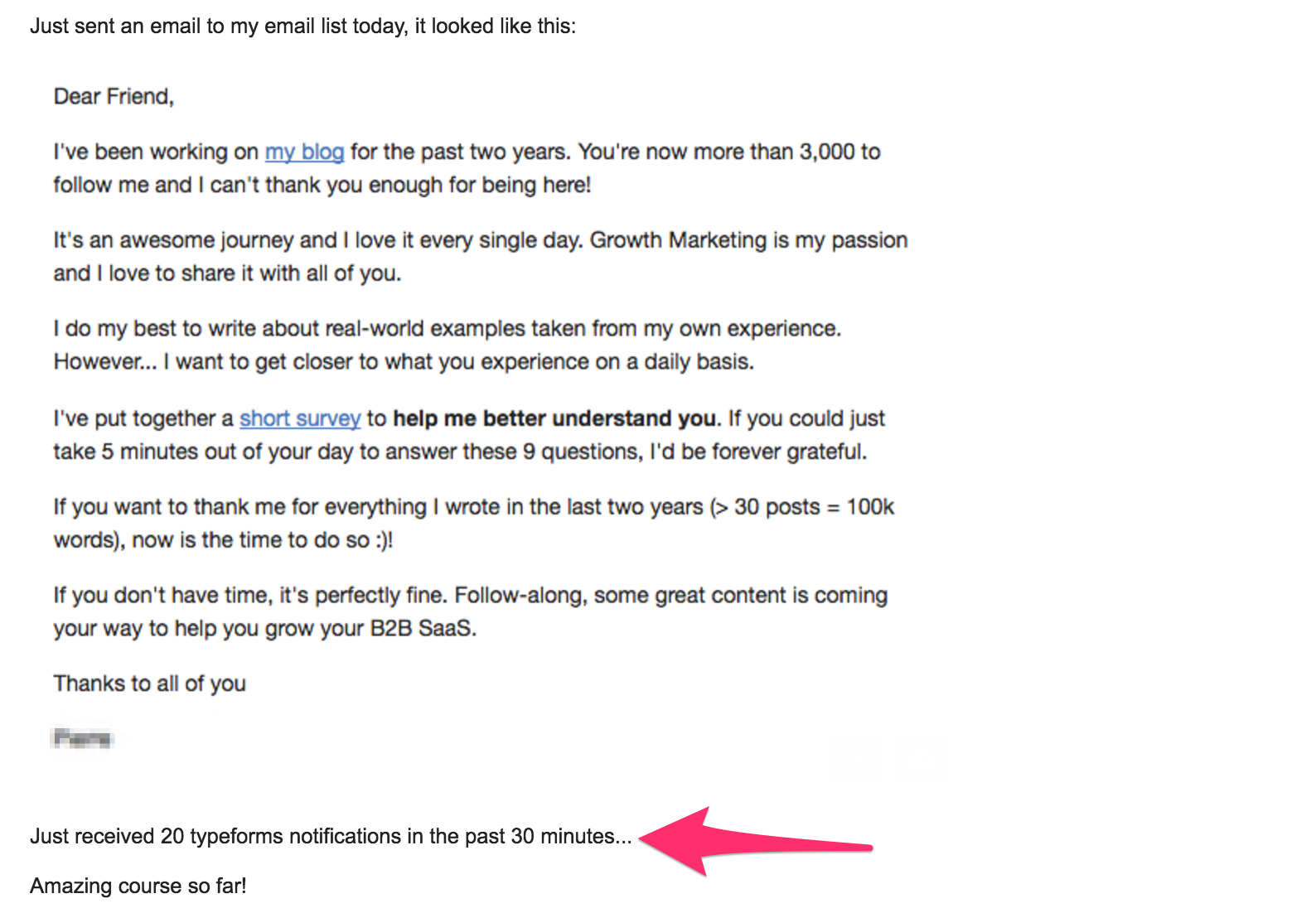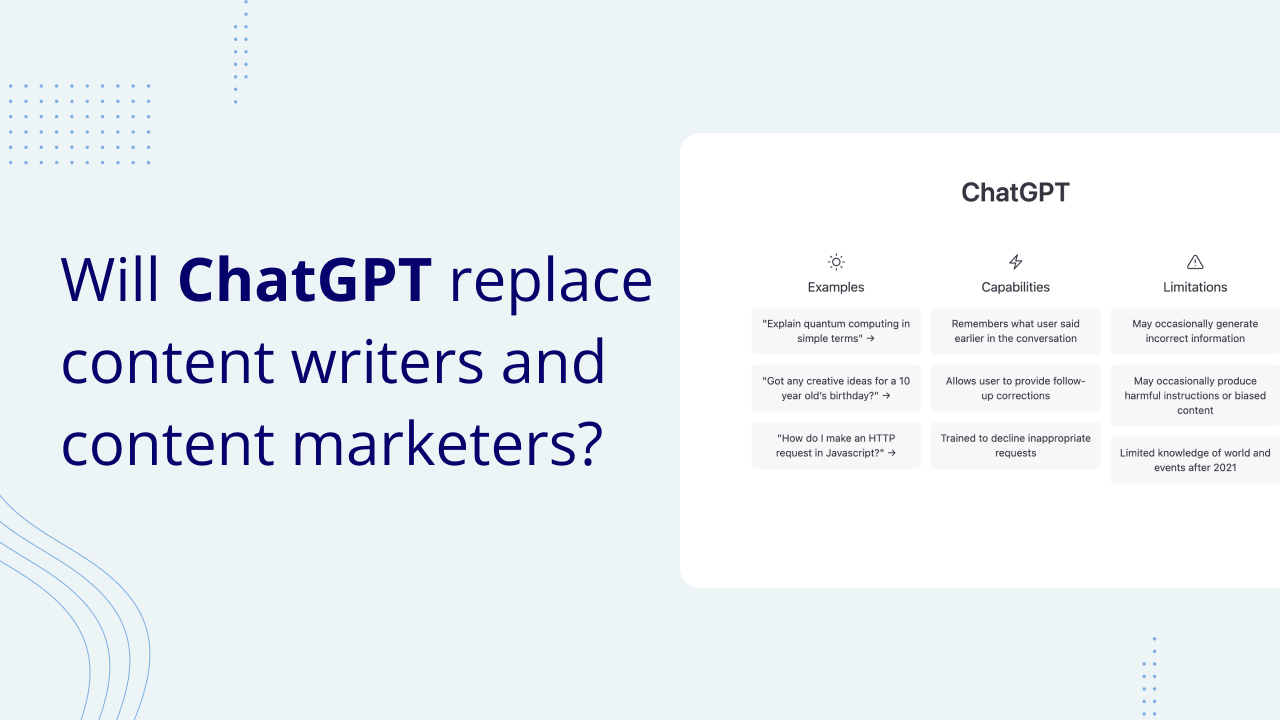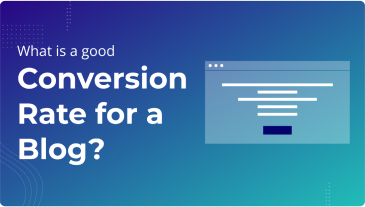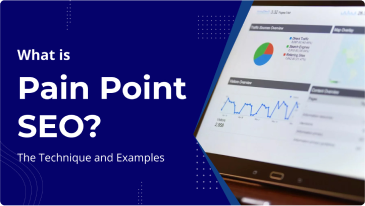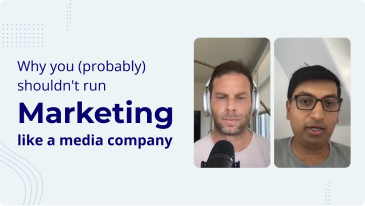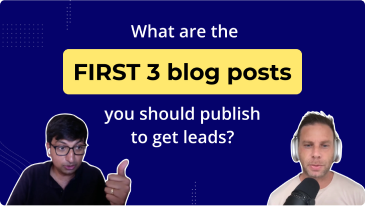This isn’t another online course success story.
In fact, it’s quite the opposite.
This post describes in detail why our course didn’t do as well (sales-wise) as we would’ve hoped.
Marketing is about testing things – not everything will work, but what’s important is that you take a step back and learn from your mistakes.
We went into our course launch thinking it was going to be a success and ended up coming out of it with an entirely new business model (an agency).
We took some time after our course launch to get feedback from the customers who purchased and the prospects who didn’t purchase. Then we determined where things went wrong and what we could’ve improved. Now, we want to share all of our learnings with you, and the new path that we’re going to because of the feedback we received.
The mistakes we made with the course were mainly around customer personas and positioning, but in order to get a full understanding of where things went wrong, it’s important for you to understand the backstory of our business.
The Story Behind Grow and Convert

For those that don’t know how and why Grow and Convert got started, here’s the story.
Devesh and I met at a dinner for marketers put on by Sujan Patel in San Francisco.
I had just switched roles from Marketing Manager at ThinkApps to Director of Growth at Everwise, and Devesh was running his CRO agency GrowthRock. Devesh and I both showed up to the dinner early, and our conversation was mainly about whether content marketing could drive high-value contracts for his agency.
Devesh, in his stubbornness, was arguing that content marketing wouldn’t work for his business because he’s trying to attract high value clients.
Having just come from ThinkApps, where I grew their blog from 0-35,000 monthly unique visitors in 6 months, and closed high-value deals directly off their blog, I made the argument that he was, well…wrong. Companies could drive large deals from content, they just need the proper strategy.
I slowly chipped away at his preconceived views about content marketing and the audience it can attract and eventually he said something to me like, “Well, if you can really do what you’re saying you can do, that skill would be extremely valuable to a lot of companies.”
I said “Yeah I know, I’m thinking about writing a book about it.” To which Devesh responded, “A book? That’s the worst idea I’ve heard…” and he proposed an interesting counter-idea:
“Why don’t you just show what you can do by starting a site and attracting real content marketers and publishing real case studies of doing this on real companies. So many blogs about content marketing are just beginner blogging stuff. Show this strategy on real companies.”
So this site was born.
Our First Public Challenge: Growing Our Own Traffic
Grow and Convert started on November 16th, 2015, with our first blog post “Content Marketing Has Become Too Trendy. Here’s What We Plan To Do About It.”
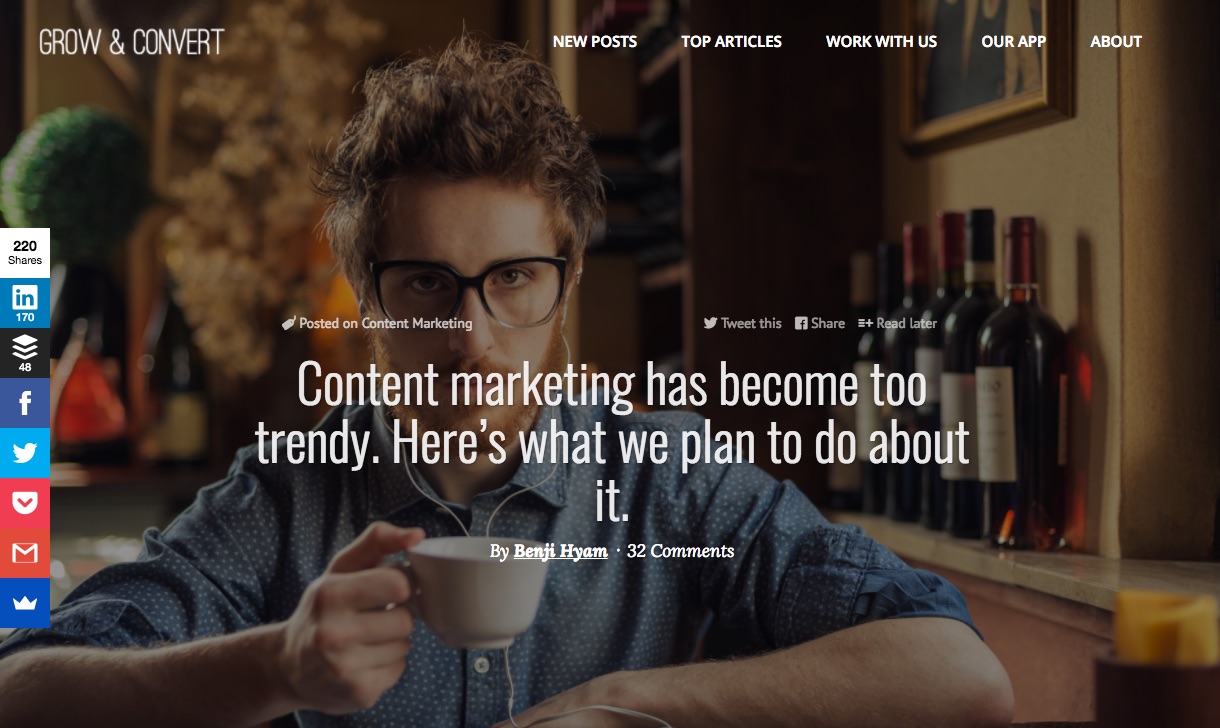
We made the argument that most companies were investing in content marketing but few were getting real results from it (traffic, leads and ultimately revenue). To prove that we knew what we were doing when it came to growing sites, we challenged ourselves to grow our new WordPress site from 0 to 40,000 unique monthly visitors in 6 months.
Devesh had real world conversion optimization experience and I had real world traffic growth experience from content marketing. So we felt like we had a wealth of case studies and stories to tell, and this would stand out from the noise in this space. (Also, hence the name Grow and Convert.)
People seemed to resonate with our content, and traffic grew. But a key question remained: what would the business be?
Our First Test Monetizing Our Site – An 8-Week Content Marketing Phone Course
Our initial (rough) vision revolved around focusing on this process we had built for content marketing. Over many years and multiple companies, I had built a process of (1) understanding customers, (2) building targeted content, and (3) promoting it to drive targeted traffic.
Devesh helped me formalize this process and together we add some pieces to it: (4) converting traffic to customers or leads (5) measuring the ROI and CAC of this whole system and (6) scale it by hiring writers.
We knew this was valuable. We knew companies were just doing “content marketing” in a haphazard way and it was grossly ineffective. We had talked to multiple companies about this.
Whereas, I had first hand experience generating lots of traffic and business with various versions of our process.
This was a definite gap in the market:
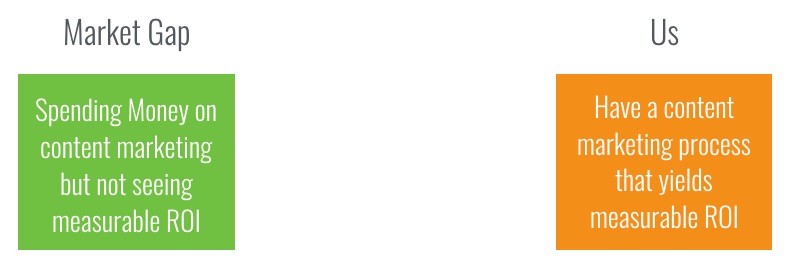
Our MVP to Bridge the Gap
Our initial hypothesis to bridge the gap was training. We figured we have a repeatable process to generate and track leads from content marketing. Let’s teach it to employees and teams so that they can be more effective executing on their content marketing strategy.
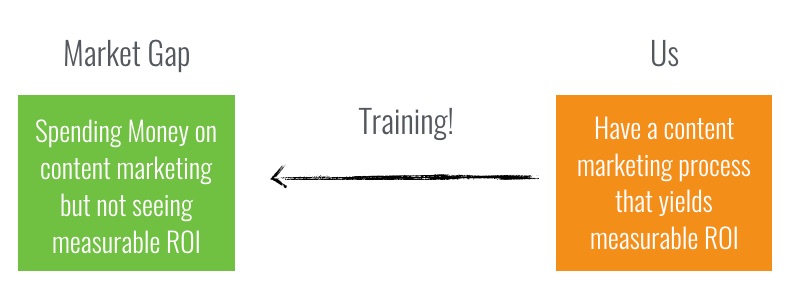
So in May of 2016, after 5 months of increased blog growth, we pivoted away from our traffic goal in order to start monetizing our site. We stopped focusing on traffic because we felt like we had proved our point that we knew what we were doing (we grew traffic to 16,000 users, 24,000 visitors in 4.5 months w/ little SEO traffic), I was living abroad with no income stream, and for Devesh to continue spending time on it, we needed to start making money.
We launched our first course (an 8-week phone course for $750) by creating a simple Google Doc landing page and including it in one of our posts.
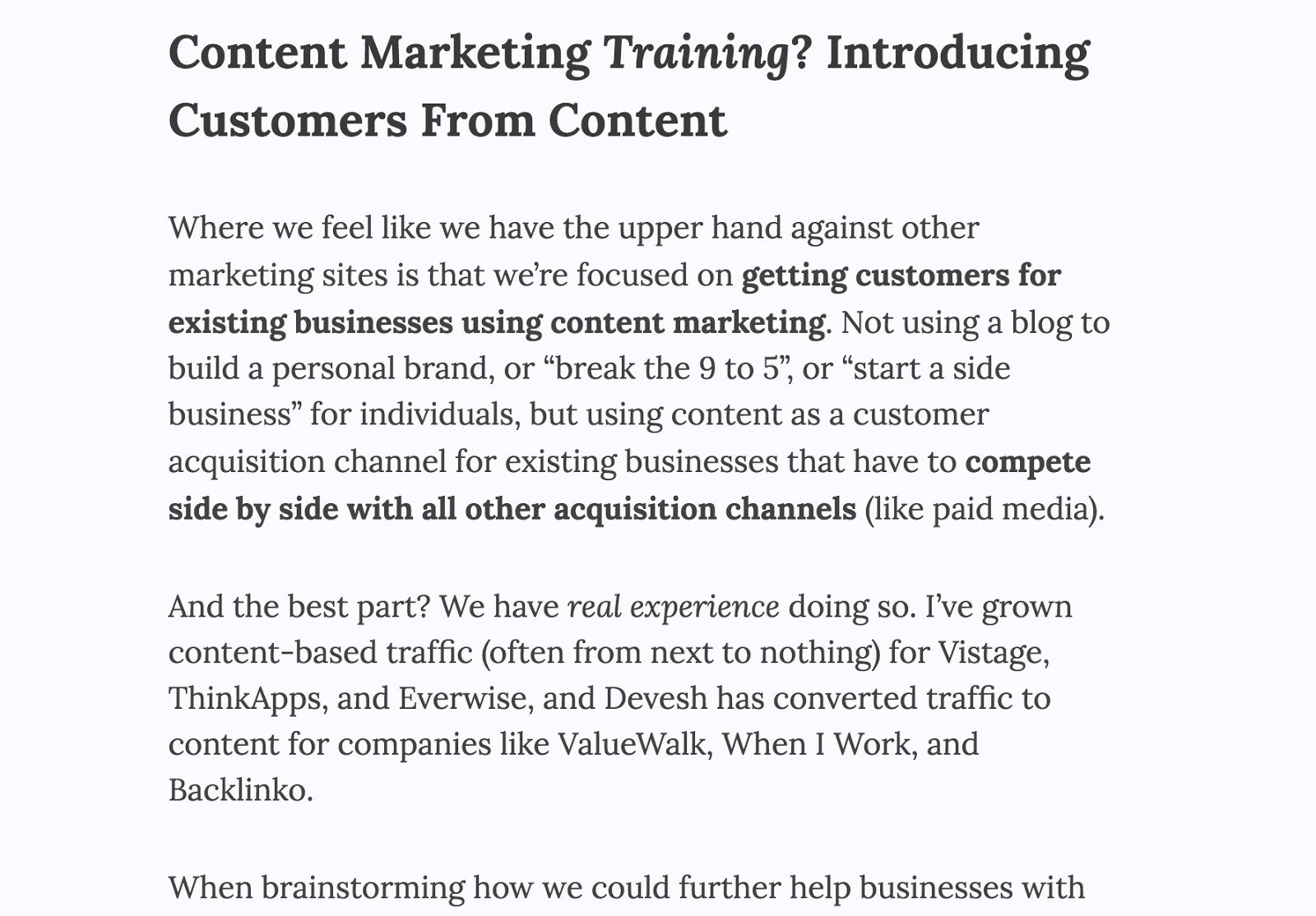
We then sent emails to the 200 most engaged subscribers on our list. At the time, we were using Mailchimp as our ESP, so we could easily see our most engaged subscribers by organizing our list by users with a 5 star Mailchimp rating.
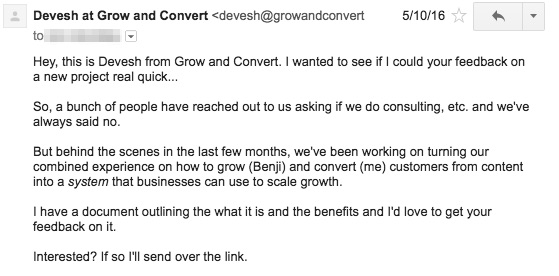
We capped the early adopter list at 10 seats, and to our surprise, we filled all 10 seats. A 5% conversion rate from outreach to close. We were off to the races.
We delivered the course over an 8-week period, distilling everything that we had learned into 4 modules – user research, content strategy, promotion and conversions. Everyone who took the course had great things to say.
But there was a catch…
The “phone” in “phone course” meant each company got 4 hour-long one on one calls with both Devesh and me. That’s a lot of calls. That’s also not scalable.
But we hoped this was just a way to validate our product hypothesis and that we could launch an online only version of this to the whole list.
However, after doing a round of post-course interviews, many of them said the main reason they purchased was because they got 1:1 phone time with both Devesh and I. Some of them clearly said that it was a great deal to get that for $750. Phrases like it was a “no brainer” were thrown around.
Ugh. So much for the online course.
Back to the drawing board…
All those phone calls just weren’t scalable. We spent 80 combined hours over the course of 8-weeks working with these companies, and while we loved working with these companies, to be perfectly honest, it was exhausting. We were coordinating calls between 8 time zones every other week and it wasn’t sustainable to keep doing things that way.
Devesh had to make this ridiculous time zone spreadsheet…and we only had 10 clients!
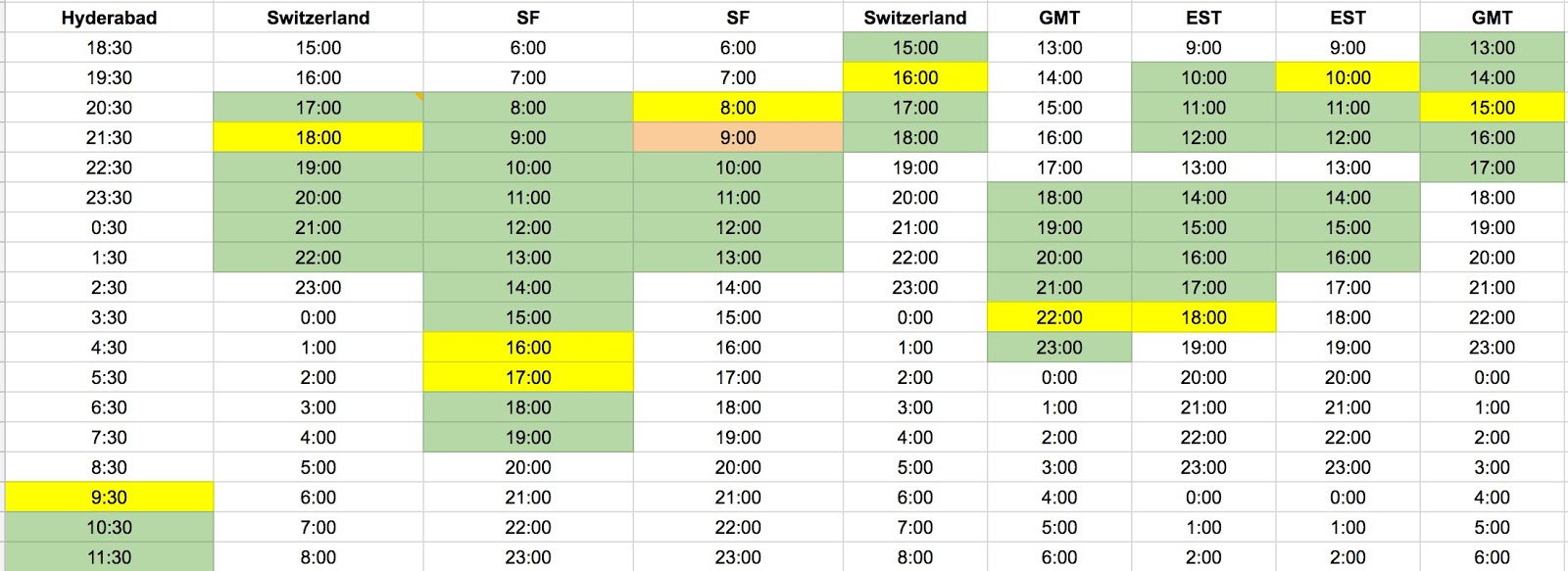
MVP 2.0: From A Phone Course To An In-person Workshop
After conducting exit interviews with people who had taken the phone course with us, we learned:
- People wanted 1:1 time with us
- Many companies had challenges measuring the ROI of content marketing
- Many of the companies we worked with wanted to learn how to scale their writing teams
So, when I returned from SE Asia back to the United States, we started working on our the next iteration of our training – Grow and Convert Live.
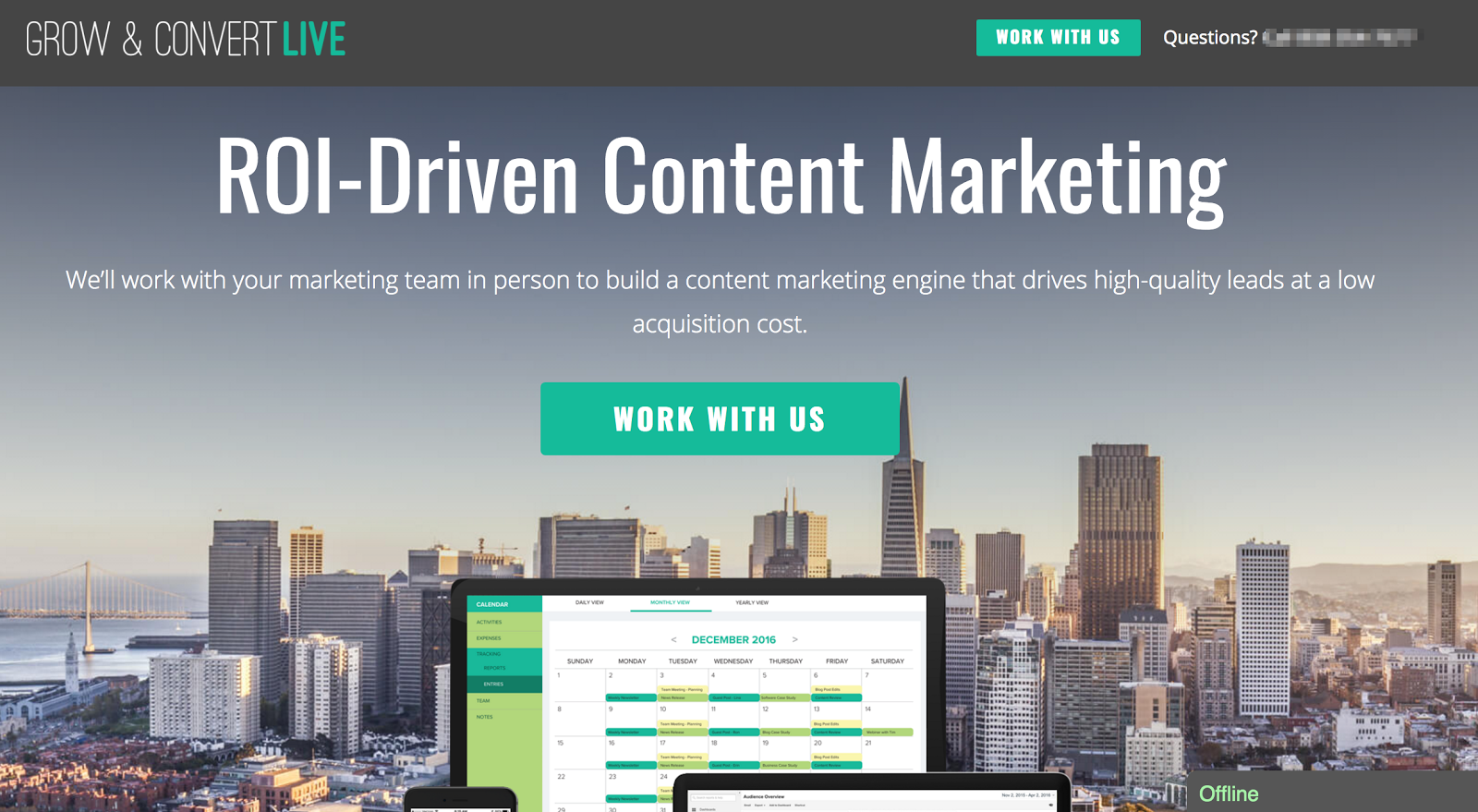
We figured we’d be good marketers and “give the people what they want”.
They want more one on one time with us? Great, let’s do it in person!
We would travel to a company, spend a full-day with their marketing team and create a custom content marketing strategy for them. We also added two more modules to our content marketing system, one on how to measure the ROI of content marketing and one on how to scale writing teams.
The companies got more time with us (8 hrs in person vs. 4 on the phone), the value was much higher (more topics, more customized work) so we could charge more ($1500 – $3000), which made more business sense for us. Win win.
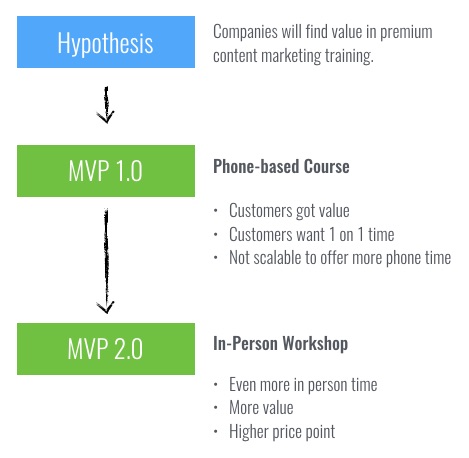
After doing the first three workshops, we learned that there was a pattern in why people were hiring us: they needed training for their new content marketing employees.
We realized that this training hit on another pain point companies had which is that few companies have senior employees that can train entry-level to mid-level marketers on content marketing. We could come into a company, and in one day set the new hire up for success in content marketing.
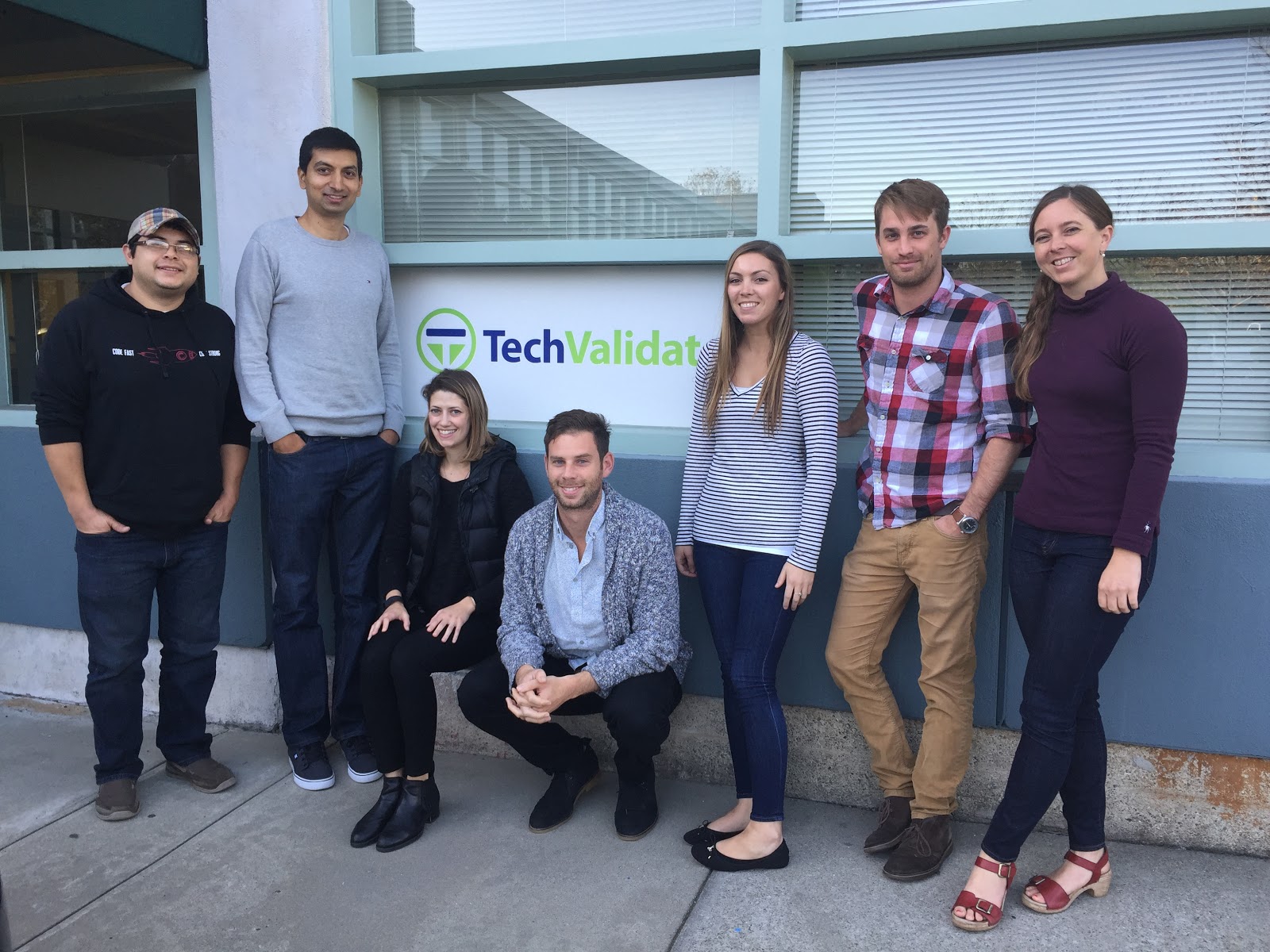
We had a ton of fun doing these workshops and were getting one request about once a month after the initial three just from people visiting our website and hearing about us from past workshop participants.
But we ran into another scale related problem with it: the demand just wasn’t high enough to offset the fact that it was one off revenue. We’d spend all this time “doing sales” to land one client, and in the end we’d get a few thousand dollars for a one day. That’s it. No recurring revenue. If we charge $3000, the LTV is $3000. We had no products “on the back end”, no software, no recurring service.
That’s a tough business to make work.
And on top of that, how many companies have “just” hired a content marketing person and are willing to invest in training for them? Not enough from what we could tell.
MVP 3.0: In order to try to scale our training to a wider audience, we went back to the online course idea
Note: The start of our mistake happened right around here.
By December 2016, with the phone and in-person training combined we had worked with around 15 – 20 companies. All or nearly all had great things to say.
So, we thought we had “validated” demand for our training, and decided to go back to our online course idea (this is a critical logical misstep).
We figured we had all of the material created, customers loved it, some even started seeing real results from it. So why not package it into an online course which was infinitely scalable?
Our goals were lofty and noble: create the best content marketing training course on the market for B2B businesses.
When looking at the competition, we thought that we had an advantage on a few points:
- Many of the courses gave high level strategies, our material was an in-depth system that gave the strategy and then showed people how to execute on it
- We realized that there weren’t any content marketing programs out there that were specific to B2B companies — we had lots of experience here, so doubled down on it
- We had tested and validated the course material with real companies. We weren’t just creating this to make a quick buck, we truly believed our process would help companies succeed with content marketing.
But here’s where we went wrong…
Subtle but important errors in our hypothesis: Personas and Positioning
Having come fresh off of selling our in-person workshop to C-level executives inside of fast-growing, venture-backed startups, we knew the pain points that these executives and companies faced inside and out.
So when we created the landing page for our online course, we used the same pitch that we gave to sell our in-person workshops, to sell our online training. The problem with doing this was that the audience on our list was mainly marketers who were interested in learning content marketing to better their own career and we were selling a course to help companies get better ROI from their content marketing operation.
The assumption that we made was that marketers that worked inside of companies would want to buy our course and tell their bosses that there was a course that could help them get better at their job.
But when we launched the course, we learned that most marketers don’t really care about making their company better, they mainly care about making themselves more valuable to their company.
It’s a subtlety in the language we used – essentially, the big mistake we made was selling the value of our training to the company instead of the value to the individual.
Why didn’t you just make the right course: for individuals to improve their content marketing skills?
The reason we shied away from creating a content marketing course for individuals in the first place mainly had to do with being scared of how we’d be perceived by others.
Both Devesh and I have grown frustrated with the “online course crowd.” We think it’s full of a lot of BS: self-proclaimed gurus who make money by teaching others how to supposedly become rich like them by following some supposed “proven” process they’ve used (e.g. creating “marketing funnels”, using Facebook ads, starting a blog, whatever). Much of that space is so slimy and scammy.
We felt like if we had created a course teaching individuals how to become better content marketers and grow their site traffic “like Grow and Convert has,” that we’d be viewed in this group.
It also didn’t align with what we knew: helping companies generate business from content marketing, not individuals. I had experience using content to drive customers to a development agency, a VC backed HR company, and a huge nationally recognized executive coaching service. I didn’t have experience helping individuals quit their job and “make money online.”
In hindsight, this was a pretty stupid way of thinking. Here’s why…
First, selling to “individuals” doesn’t only mean “people trying to start a passive income internet businesses.”
We talked to multiple real individuals after our course launch that just wanted to use our course build their own skill so that they could get more freelance clients, switch jobs, or become better at their job.
Second, even if we wanted to just sell our training (online, offline, whatever) to companies, we still had to sell to the individuals within the company. And as we said above, the individuals inside the company don’t really care about the company’s ROI, they care about their own lives (their career, promotions, etc.), so the positioning is totally different.
A silver lining from the experience: demand for a “done for you” content marketing agency
While we only achieved a little under half of our revenue goal for the first course launch, there are a few good things that came from the experience.
The first being that the people who did purchase the course, had great feedback about the material:
The second being that there was an interesting trend in questions that we received when we launched our course that we weren’t expecting.
While some were interested in training to learn how to do content marketing better for their companies, a lot of business owners kept writing in with the same question – do you offer a “done-for-you content marketing service”:


After continuing to get messages on our landing page and emails from readers inquiring about content marketing services, we decided that maybe we should test out a service.
We launched a done-for-you content marketing service the week after our course launch, and within 3 few days of the announcement of our new service, we landed our first client. Then a few weeks later, we got our second.
Going forward, much of our focus will be put into scaling a content marketing agency. The good thing for you guys is that we’ll be profiling case studies of what we’re doing for them. So you’ll get content from deep in the trenches of what we’re doing, all of our new tests, what works and what doesn’t work.
Lastly, we’re now playing with the idea of launching a course for the freelancers, marketers inside of companies who want to build their content marketing skills so they can advance in their career or eventually go out on their own. Feedback from people who didn’t purchase the course leads us to believe this is what a lot of you want. We’re still unsure if we’re going to do this or not, but if it’s something you’d be interested in, feel free to email us or comment below.
The learning from all of this is that there’s never a clear path to success. A lot of people like to write posts that make things look easy – “All you need to do is build an email list, create a course, and boom you’re at six-figures and you’re successful like me.”
Entrepreneurship isn’t easy regardless of your past experience. We believe that it’s important to share our mistakes so that we can help prevent you from making the same ones, and just so you can see that you’re not alone when your path isn’t smooth.
We all make mistakes, but it’s how you deal with adversity that defines that outcome of your business.

Like this article? We produce stories like these for our clients, learn more here.


